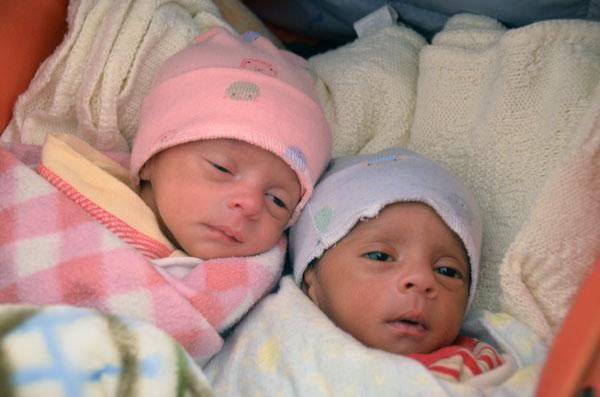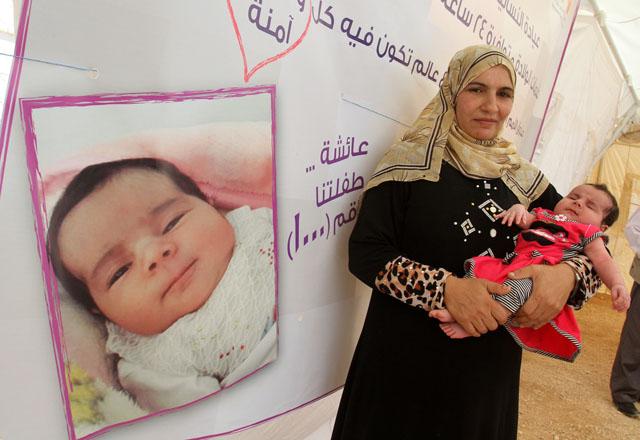You are here
5,000 babies delivered at Zaatari camp's UNFPA-supported clinic
By Muath Freij - Mar 01,2016 - Last updated at Mar 01,2016

Malak and Ahmad, who were born 18 days ago at the Zaatari Refugee Camp, sleep at the UNFPA-supported reproductive health clinic on Tuesday (Photo by Muath Freij)
ZAATARI REFUGEE CAMP — The UNFPA celebrated on Tuesday the safe delivery of 5,000 Syrian babies at the Zaatari Refugee Camp at the UN agency-supported reproductive health clinic.
UNFPA representatives and a number of Syrian mothers who safely delivered their new babies in the camp, some 80km northeast of Amman, attended the event.
Mariam Abdul Qader, who delivered twins 18 days ago, said being pregnant at the camp was difficult.
"It was a tough decision to have them in the camp because the environment is different, but thank God I delivered them healthy," Abdul Qader, who has been in the camp for three years and is a mother of six children, told The Jordan Times.
Daniel Baker, regional humanitarian coordinator at the UNFPA and the head of the agency's country office in Jordan, said the event was aimed at highlighting the needs of women at the camp, who face challenges that make them more vulnerable.
"One of those challenges is pregnancy, women get pregnant whether there is an emergency or not, whether there is a war or not, and so what is going to happen during the nine months of that pregnancy?" he asked. "What we want is a healthy baby," he told The Jordan Times during the ceremony.
Baker said the UNFPA, whether in Zaatari camp or in the world, is working to provide good services to women in order to have a healthy and smooth pregnancy.
The agency started working at the camp in June 2013, he noted, to ensure that both the baby and the mother are healthy.
The UNFPA's Zaatari reproductive health clinic delivers on average 8-10 babies per day, with 2-3 complicated delivery cases which are referred to the Moroccan field hospital inside the camp, according to a statement from the agency.
The clinic includes 24 beds and a total of 39 qualified Jordanian gynaecologists, paediatricians, midwives and nurses who work at the clinic around the clock, the statement added.
The medical facility provides 20,000 Syrian women and girls with comprehensive reproductive health and protection services, including 2,000 pregnant women in the camp.
The clinic is operated by the Jordan Health Aid Society and the Institute for Family Health, and is supported technically by the UNFPA and financially by the European Commission and the US government, according to the statement.
Mohammad Salameh, whose daughter Rima was the baby number 5,000 to be delivered at the camp.
I am happy that my daughter was delivered safely and was given great medical attention," he said.
Related Articles
HH Princess Sara Zeid on Wednesday stressed the need to extend support to the UNFPA and its partners to continue delivering services for Syrian women refugees.
The UNFPA on Monday celebrated the birth of baby number 1,000 at its clinic in the Zaatari Refugee Camp, which currently houses over 85,000 Syrians.
UNFPA has launched a reproductive health campaign in the Zaatari Refugee Camp, focusing on family planning methods, breastfeeding and danger signs during pregnancy, the UN agency said in a statement released Wednesday.












